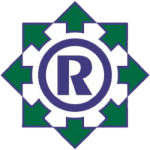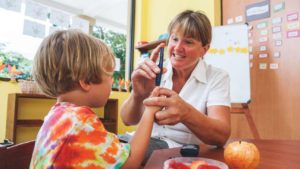Referral
Referrals may be generated by a parent, a student, a classroom teacher, a special educator, or a physician who is familiar with the child.
According to IDEA rules and regulations, students aged 5-21 must be evaluated by a licensed Speech/Language Pathologist in order to determine eligibility for special education based upon a communication disorder or autism spectrum disorder.
The IEP team (inclusive of parents) meets to discuss concerns, review records, and decide upon the most appropriate option:
- No further action is needed at the time
- Implement additional classroom modifications and strategies for a designed time and reconvene the team to evaluate progress/effects and again determine the course of action.
- A communication evaluation conducted by a licensed SLP.
Evaluation
The evaluation will include standardized tests, observations, communication samples, and interviews with staff, parents, and/or the child.
Listed below are some common terms related to communication:
- Reception involves accurately hearing sounds and words as well as understanding their meanings. (receptive)
- Expression generally considers one’s ability to formulate and share coherent strings of information. (expressive)
- Fluency is the general ease with which we communicate. Variations may include sound and/or word repetitions, sound prolongations, unusual breathing/speaking patterns or related changes in movement of facial musculature. Depending on the degree and frequency of occurrence, these characteristics may be referred to as stuttering.
- Speech Sound Production, also referred to as
- Articulation or Phonology, addresses an individual’s ability to produce the sounds of language. Overall intelligibility of a speaker is determined by how accurately they can produce our language’s sounds in various word positions (beginning, middle, end) and by how they maintain integrity of sound production (intelligibility) during conversational speech.
- Comprehension involves listening to the language of others and constructing meaning from these communications. When we “comprehend”, we listen and understand what the intent of someone else’s words convey. Comprehension may refer to processing of either verbal input or printed/written input.
- Voice or vocal quality should be clear and age-appropriate without distracting acoustic features such as hoarseness (stridency), breathiness, or obvious struggle.
- Pragmatics provides us with conversational rules. We change the quantity and quality of our talk based upon the perceived needs of our talking partners. We notice breakdowns and attempt repairs.
- Semantics refers to the meaning of words, referential definitions, as they occur in context.
- Morphology focuses on the smallest word units such as ‘s’=plural, “un”-not.
Syntax addresses between-word grammar structures such as rules of subject-verb agreement.
According to IDEA law, at least one standardized assessment tool must be administered to assess eligibility for communication disorder. Scores will serve as one indicator as to how your child’s communication skills performance compares to that of same-aged peers. Scores that are significantly (one and a half or more standard deviations) below those of same age peers may indicate a need to consider a communication disorder. Tests and subtests measure the child’s ability to understand, related to, and use of language and speech clearly and appropriately. The team has agreed that the following will be administered as appropriate:
- Peabody Picture Vocabulary Test-IV (receptive)
- Expressive Vocabulary Test-2 (expressive)
- Test of Problem Solving (synthesis/analysis).
- Clinical Evaluation of Language Fundamentals-IV (receptive and expressive subtests)
- Test of Language Development -4 Primary/Intermediate (receptive and expressive)
- WORD Test Elementary -Revised (receptive and expressive)
- WORD Test Adolescent – 2 (receptive and expressive)
- Preschool Language Scale-4- (receptive and expressive)
- Bracken Test of Basic Concepts (receptive and expressive)
- Test of Auditory Comprehension of Language (receptive)
- Test of Semantic Skills, Primary and Intermediate (receptive/expressive)
- Functional Communication Profile -Revised (functional language skills)
- Goldman-Fristoe Test of Articulation -2 (sound production)
- Arizona Articulation Proficiency Scale-3rd revision (sound production)
- Assessment of Phonological Processes R (sound production)
- Photo Articulation Test (sound production)
- Stuttering Severity Instrument -3 (fluency)
In addition to standardized assessment, the following procedures should be a part of a communication evaluation:
- Hearing Screening which includes pure tone hearing screen to assess bilateral sound reception at a basic level and a tympanic screening which screens middle ear functioning.
- Oral Motor Examination which will reveal any structural or functional abnormalities that may interfere with speech and/or feeding/swallowing competencies.
- Parental interview (regarding developmental and communication skills)
A child’s functional or spontaneous competencies must also be considered. Observation and analysis of the child’s communication competencies in his/her educational settings may include sampling and analysis of:
- Spontaneous, conversational language
- Spontaneous speech
- Literacy competencies (sound awareness, spelling, reading, reading comprehension, writing content and organization)
- Keyboarding competence
- Ability to attend and respond to directions as well as to “filter out” extraneous input
- Planning, organization, reasoning, and problem solving related to curriculum (referred to as “Executive Functioning”)
- Memory and recall of general information, stories, poems, songs
- Pragmatic Communication (ability to coordinate conversational relationships)
- Ability to convey information (verbal or written) in a well-organized, cohesive manner
Eligibility
Upon completion of evaluation the team will convene again to review results. Areas the team can consider for a communication disorder include; Fluency, Voice, Phonology or Articulation and Language which includes; syntax, morphology, pragmatics, or semantics. For a language disorder, the team has to determine if the disability is the result of another disability (such as intellectual disability, autism, etc.) before eligibility can be determined. The team will further need to determine that the disability has an adverse impact on education. If the team determines that the student qualifies for special education, an IEP will be developed.
 Assistive Technology
Assistive Technology

 Psychological Services
Psychological Services School Nursing Services
School Nursing Services Speech Language Therapy
Speech Language Therapy